Reflective Learning, Gibbs Cycle, and Assessment Feedback Essay
VerifiedAdded on 2023/06/10
|7
|1779
|175
Essay
AI Summary
This essay delves into the concept of reflective learning, highlighting its significance in managing student tasks and evaluating learning behaviors. It introduces the Gibbs Reflective Cycle, a structured approach for analyzing experiences through stages like description, feelings, evaluation, analysis, conclusion, and action plan. The essay explores the roles of feedback and feedforward in academic settings, emphasizing their importance in formative and summative assessments. It argues that the Gibbs cycle provides a framework for understanding feedback, while feedforward aligns with the action plan stage, enabling students to refine their approaches and prepare for future challenges. The essay concludes by underscoring the value of reflective learning and feedback mechanisms in fostering self-awareness, enhancing performance, and promoting continuous improvement in academic pursuits. It also emphasizes the importance of feedforward in creating future growth of the students as well as manage and conduct their formative and summative assessment in proper manner.
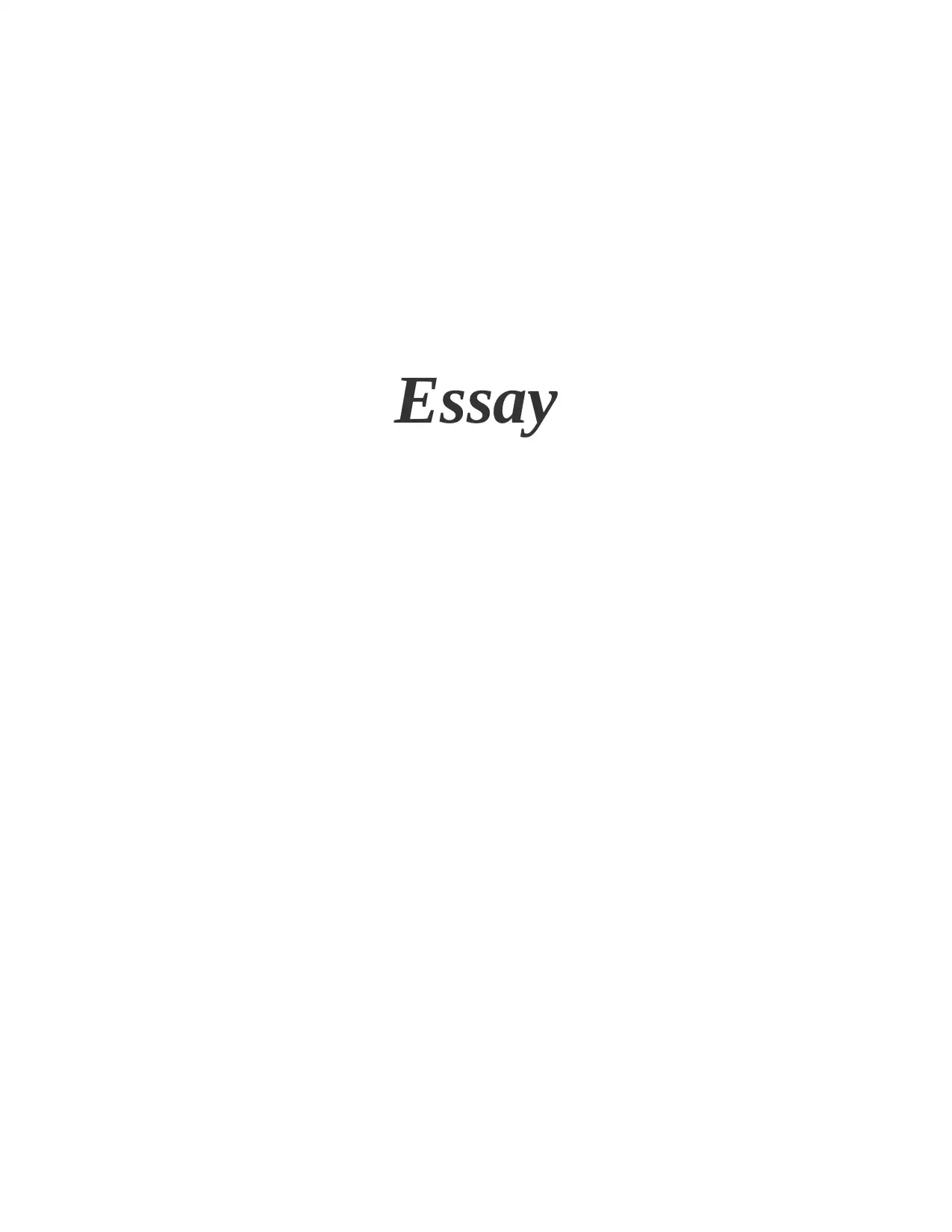
Essay
Paraphrase This Document
Need a fresh take? Get an instant paraphrase of this document with our AI Paraphraser
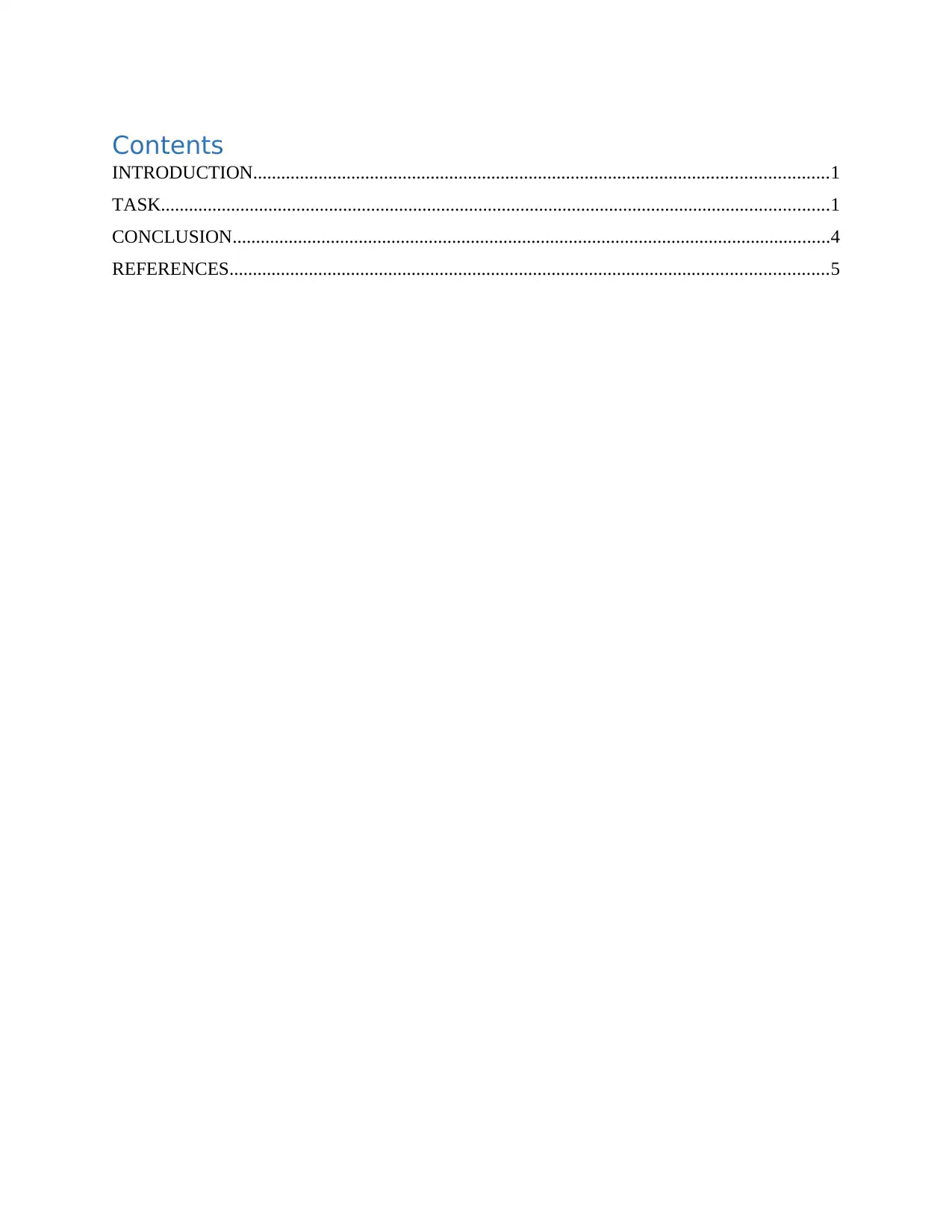
Contents
INTRODUCTION...........................................................................................................................1
TASK...............................................................................................................................................1
CONCLUSION................................................................................................................................4
REFERENCES................................................................................................................................5
INTRODUCTION...........................................................................................................................1
TASK...............................................................................................................................................1
CONCLUSION................................................................................................................................4
REFERENCES................................................................................................................................5
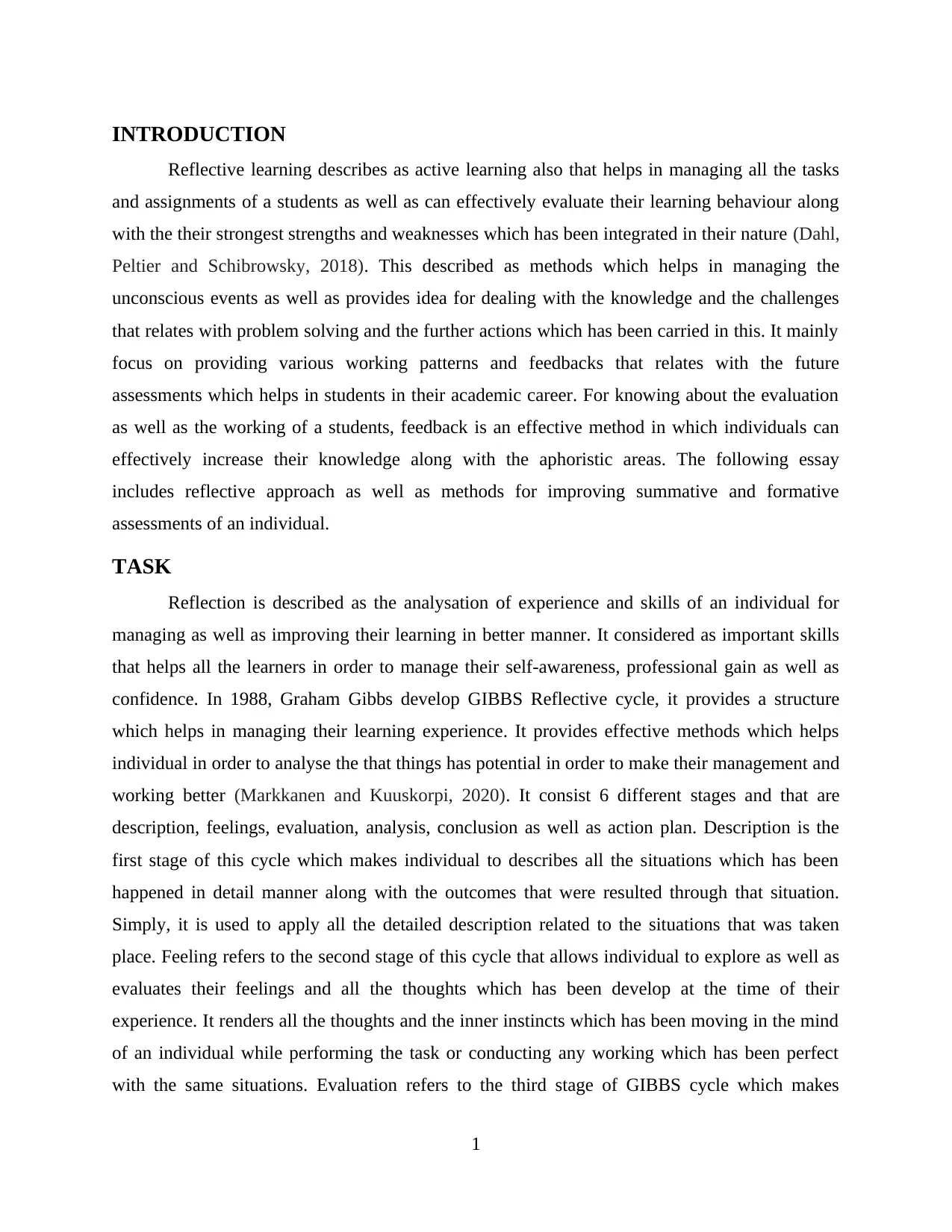
INTRODUCTION
Reflective learning describes as active learning also that helps in managing all the tasks
and assignments of a students as well as can effectively evaluate their learning behaviour along
with the their strongest strengths and weaknesses which has been integrated in their nature (Dahl,
Peltier and Schibrowsky, 2018). This described as methods which helps in managing the
unconscious events as well as provides idea for dealing with the knowledge and the challenges
that relates with problem solving and the further actions which has been carried in this. It mainly
focus on providing various working patterns and feedbacks that relates with the future
assessments which helps in students in their academic career. For knowing about the evaluation
as well as the working of a students, feedback is an effective method in which individuals can
effectively increase their knowledge along with the aphoristic areas. The following essay
includes reflective approach as well as methods for improving summative and formative
assessments of an individual.
TASK
Reflection is described as the analysation of experience and skills of an individual for
managing as well as improving their learning in better manner. It considered as important skills
that helps all the learners in order to manage their self-awareness, professional gain as well as
confidence. In 1988, Graham Gibbs develop GIBBS Reflective cycle, it provides a structure
which helps in managing their learning experience. It provides effective methods which helps
individual in order to analyse the that things has potential in order to make their management and
working better (Markkanen and Kuuskorpi, 2020). It consist 6 different stages and that are
description, feelings, evaluation, analysis, conclusion as well as action plan. Description is the
first stage of this cycle which makes individual to describes all the situations which has been
happened in detail manner along with the outcomes that were resulted through that situation.
Simply, it is used to apply all the detailed description related to the situations that was taken
place. Feeling refers to the second stage of this cycle that allows individual to explore as well as
evaluates their feelings and all the thoughts which has been develop at the time of their
experience. It renders all the thoughts and the inner instincts which has been moving in the mind
of an individual while performing the task or conducting any working which has been perfect
with the same situations. Evaluation refers to the third stage of GIBBS cycle which makes
1
Reflective learning describes as active learning also that helps in managing all the tasks
and assignments of a students as well as can effectively evaluate their learning behaviour along
with the their strongest strengths and weaknesses which has been integrated in their nature (Dahl,
Peltier and Schibrowsky, 2018). This described as methods which helps in managing the
unconscious events as well as provides idea for dealing with the knowledge and the challenges
that relates with problem solving and the further actions which has been carried in this. It mainly
focus on providing various working patterns and feedbacks that relates with the future
assessments which helps in students in their academic career. For knowing about the evaluation
as well as the working of a students, feedback is an effective method in which individuals can
effectively increase their knowledge along with the aphoristic areas. The following essay
includes reflective approach as well as methods for improving summative and formative
assessments of an individual.
TASK
Reflection is described as the analysation of experience and skills of an individual for
managing as well as improving their learning in better manner. It considered as important skills
that helps all the learners in order to manage their self-awareness, professional gain as well as
confidence. In 1988, Graham Gibbs develop GIBBS Reflective cycle, it provides a structure
which helps in managing their learning experience. It provides effective methods which helps
individual in order to analyse the that things has potential in order to make their management and
working better (Markkanen and Kuuskorpi, 2020). It consist 6 different stages and that are
description, feelings, evaluation, analysis, conclusion as well as action plan. Description is the
first stage of this cycle which makes individual to describes all the situations which has been
happened in detail manner along with the outcomes that were resulted through that situation.
Simply, it is used to apply all the detailed description related to the situations that was taken
place. Feeling refers to the second stage of this cycle that allows individual to explore as well as
evaluates their feelings and all the thoughts which has been develop at the time of their
experience. It renders all the thoughts and the inner instincts which has been moving in the mind
of an individual while performing the task or conducting any working which has been perfect
with the same situations. Evaluation refers to the third stage of GIBBS cycle which makes
1
⊘ This is a preview!⊘
Do you want full access?
Subscribe today to unlock all pages.

Trusted by 1+ million students worldwide
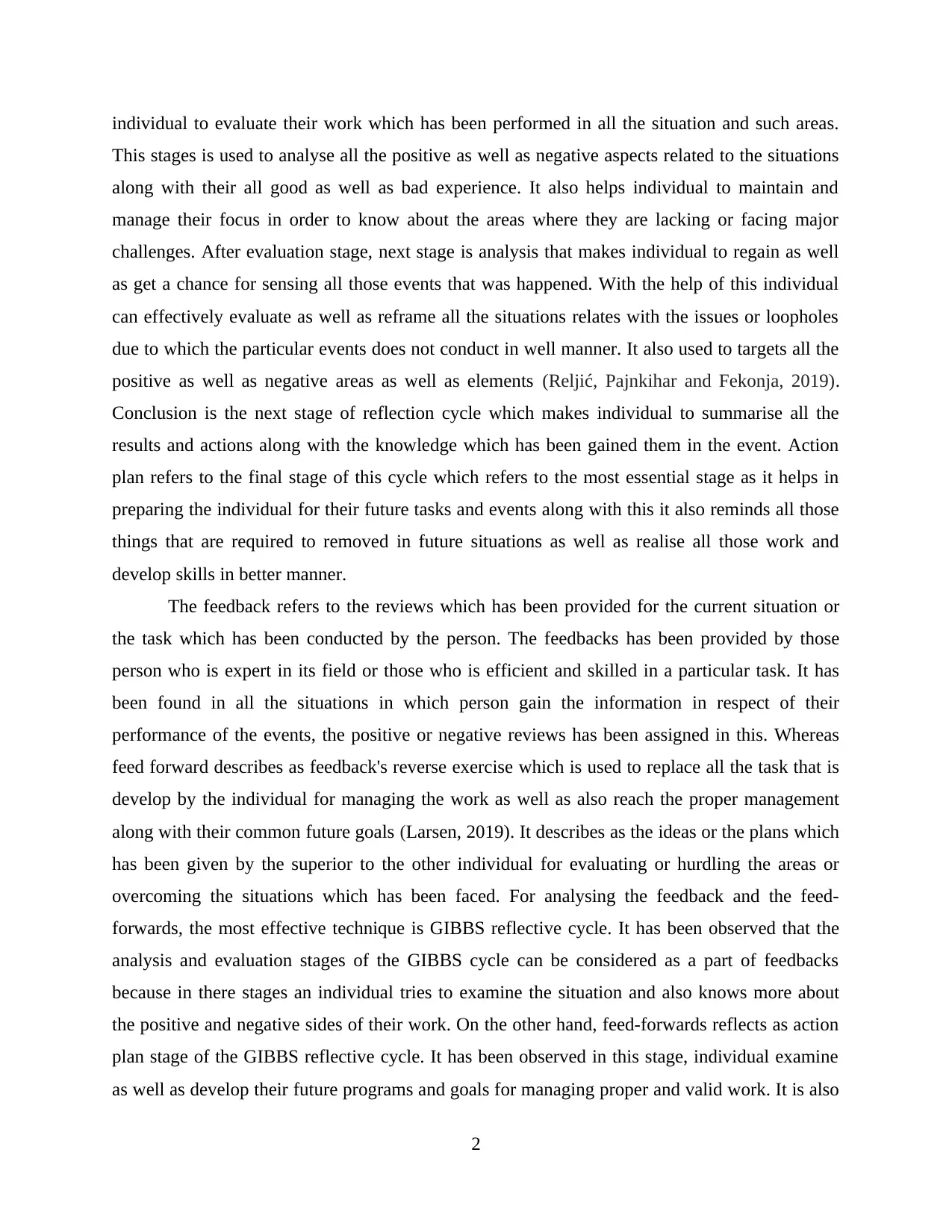
individual to evaluate their work which has been performed in all the situation and such areas.
This stages is used to analyse all the positive as well as negative aspects related to the situations
along with their all good as well as bad experience. It also helps individual to maintain and
manage their focus in order to know about the areas where they are lacking or facing major
challenges. After evaluation stage, next stage is analysis that makes individual to regain as well
as get a chance for sensing all those events that was happened. With the help of this individual
can effectively evaluate as well as reframe all the situations relates with the issues or loopholes
due to which the particular events does not conduct in well manner. It also used to targets all the
positive as well as negative areas as well as elements (Reljić, Pajnkihar and Fekonja, 2019).
Conclusion is the next stage of reflection cycle which makes individual to summarise all the
results and actions along with the knowledge which has been gained them in the event. Action
plan refers to the final stage of this cycle which refers to the most essential stage as it helps in
preparing the individual for their future tasks and events along with this it also reminds all those
things that are required to removed in future situations as well as realise all those work and
develop skills in better manner.
The feedback refers to the reviews which has been provided for the current situation or
the task which has been conducted by the person. The feedbacks has been provided by those
person who is expert in its field or those who is efficient and skilled in a particular task. It has
been found in all the situations in which person gain the information in respect of their
performance of the events, the positive or negative reviews has been assigned in this. Whereas
feed forward describes as feedback's reverse exercise which is used to replace all the task that is
develop by the individual for managing the work as well as also reach the proper management
along with their common future goals (Larsen, 2019). It describes as the ideas or the plans which
has been given by the superior to the other individual for evaluating or hurdling the areas or
overcoming the situations which has been faced. For analysing the feedback and the feed-
forwards, the most effective technique is GIBBS reflective cycle. It has been observed that the
analysis and evaluation stages of the GIBBS cycle can be considered as a part of feedbacks
because in there stages an individual tries to examine the situation and also knows more about
the positive and negative sides of their work. On the other hand, feed-forwards reflects as action
plan stage of the GIBBS reflective cycle. It has been observed in this stage, individual examine
as well as develop their future programs and goals for managing proper and valid work. It is also
2
This stages is used to analyse all the positive as well as negative aspects related to the situations
along with their all good as well as bad experience. It also helps individual to maintain and
manage their focus in order to know about the areas where they are lacking or facing major
challenges. After evaluation stage, next stage is analysis that makes individual to regain as well
as get a chance for sensing all those events that was happened. With the help of this individual
can effectively evaluate as well as reframe all the situations relates with the issues or loopholes
due to which the particular events does not conduct in well manner. It also used to targets all the
positive as well as negative areas as well as elements (Reljić, Pajnkihar and Fekonja, 2019).
Conclusion is the next stage of reflection cycle which makes individual to summarise all the
results and actions along with the knowledge which has been gained them in the event. Action
plan refers to the final stage of this cycle which refers to the most essential stage as it helps in
preparing the individual for their future tasks and events along with this it also reminds all those
things that are required to removed in future situations as well as realise all those work and
develop skills in better manner.
The feedback refers to the reviews which has been provided for the current situation or
the task which has been conducted by the person. The feedbacks has been provided by those
person who is expert in its field or those who is efficient and skilled in a particular task. It has
been found in all the situations in which person gain the information in respect of their
performance of the events, the positive or negative reviews has been assigned in this. Whereas
feed forward describes as feedback's reverse exercise which is used to replace all the task that is
develop by the individual for managing the work as well as also reach the proper management
along with their common future goals (Larsen, 2019). It describes as the ideas or the plans which
has been given by the superior to the other individual for evaluating or hurdling the areas or
overcoming the situations which has been faced. For analysing the feedback and the feed-
forwards, the most effective technique is GIBBS reflective cycle. It has been observed that the
analysis and evaluation stages of the GIBBS cycle can be considered as a part of feedbacks
because in there stages an individual tries to examine the situation and also knows more about
the positive and negative sides of their work. On the other hand, feed-forwards reflects as action
plan stage of the GIBBS reflective cycle. It has been observed in this stage, individual examine
as well as develop their future programs and goals for managing proper and valid work. It is also
2
Paraphrase This Document
Need a fresh take? Get an instant paraphrase of this document with our AI Paraphraser
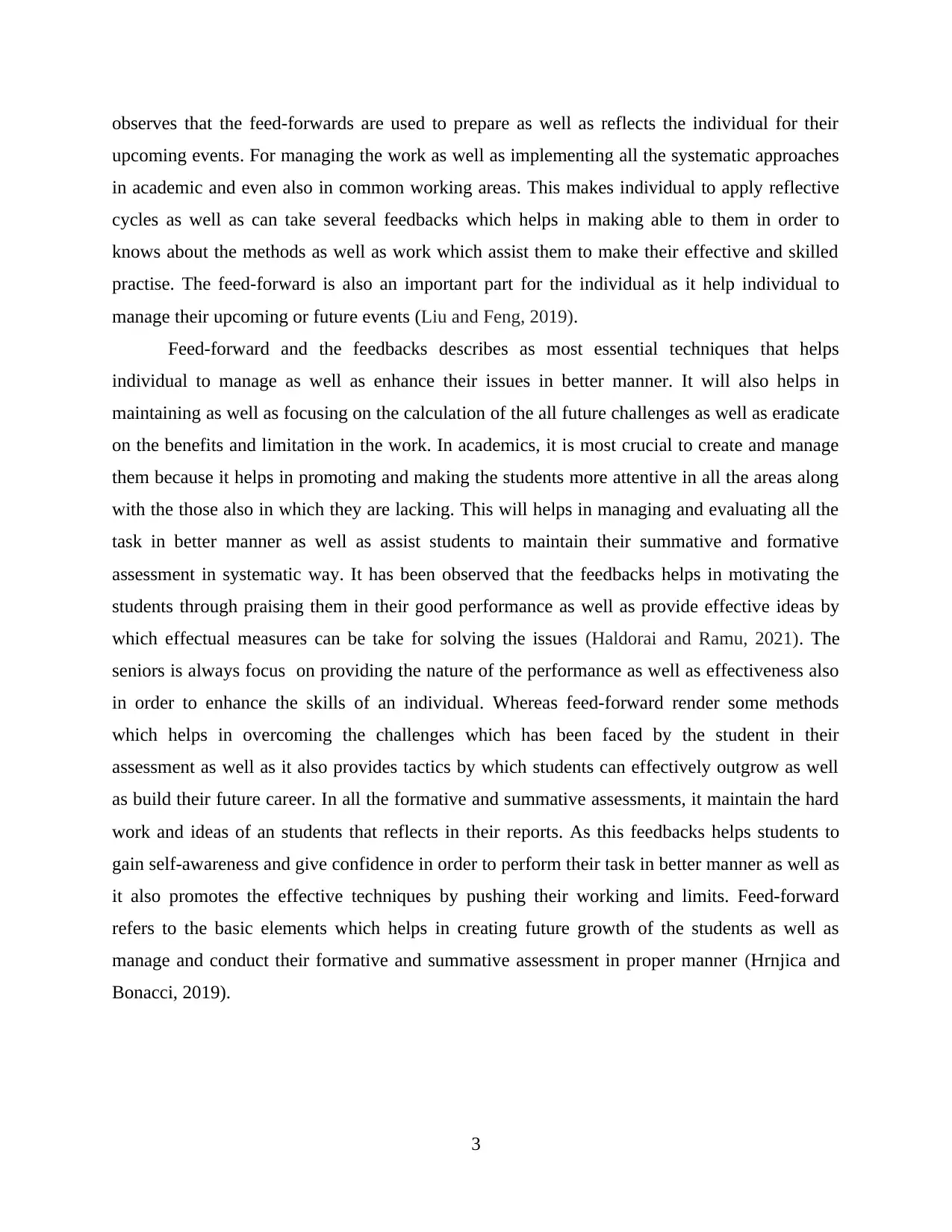
observes that the feed-forwards are used to prepare as well as reflects the individual for their
upcoming events. For managing the work as well as implementing all the systematic approaches
in academic and even also in common working areas. This makes individual to apply reflective
cycles as well as can take several feedbacks which helps in making able to them in order to
knows about the methods as well as work which assist them to make their effective and skilled
practise. The feed-forward is also an important part for the individual as it help individual to
manage their upcoming or future events (Liu and Feng, 2019).
Feed-forward and the feedbacks describes as most essential techniques that helps
individual to manage as well as enhance their issues in better manner. It will also helps in
maintaining as well as focusing on the calculation of the all future challenges as well as eradicate
on the benefits and limitation in the work. In academics, it is most crucial to create and manage
them because it helps in promoting and making the students more attentive in all the areas along
with the those also in which they are lacking. This will helps in managing and evaluating all the
task in better manner as well as assist students to maintain their summative and formative
assessment in systematic way. It has been observed that the feedbacks helps in motivating the
students through praising them in their good performance as well as provide effective ideas by
which effectual measures can be take for solving the issues (Haldorai and Ramu, 2021). The
seniors is always focus on providing the nature of the performance as well as effectiveness also
in order to enhance the skills of an individual. Whereas feed-forward render some methods
which helps in overcoming the challenges which has been faced by the student in their
assessment as well as it also provides tactics by which students can effectively outgrow as well
as build their future career. In all the formative and summative assessments, it maintain the hard
work and ideas of an students that reflects in their reports. As this feedbacks helps students to
gain self-awareness and give confidence in order to perform their task in better manner as well as
it also promotes the effective techniques by pushing their working and limits. Feed-forward
refers to the basic elements which helps in creating future growth of the students as well as
manage and conduct their formative and summative assessment in proper manner (Hrnjica and
Bonacci, 2019).
3
upcoming events. For managing the work as well as implementing all the systematic approaches
in academic and even also in common working areas. This makes individual to apply reflective
cycles as well as can take several feedbacks which helps in making able to them in order to
knows about the methods as well as work which assist them to make their effective and skilled
practise. The feed-forward is also an important part for the individual as it help individual to
manage their upcoming or future events (Liu and Feng, 2019).
Feed-forward and the feedbacks describes as most essential techniques that helps
individual to manage as well as enhance their issues in better manner. It will also helps in
maintaining as well as focusing on the calculation of the all future challenges as well as eradicate
on the benefits and limitation in the work. In academics, it is most crucial to create and manage
them because it helps in promoting and making the students more attentive in all the areas along
with the those also in which they are lacking. This will helps in managing and evaluating all the
task in better manner as well as assist students to maintain their summative and formative
assessment in systematic way. It has been observed that the feedbacks helps in motivating the
students through praising them in their good performance as well as provide effective ideas by
which effectual measures can be take for solving the issues (Haldorai and Ramu, 2021). The
seniors is always focus on providing the nature of the performance as well as effectiveness also
in order to enhance the skills of an individual. Whereas feed-forward render some methods
which helps in overcoming the challenges which has been faced by the student in their
assessment as well as it also provides tactics by which students can effectively outgrow as well
as build their future career. In all the formative and summative assessments, it maintain the hard
work and ideas of an students that reflects in their reports. As this feedbacks helps students to
gain self-awareness and give confidence in order to perform their task in better manner as well as
it also promotes the effective techniques by pushing their working and limits. Feed-forward
refers to the basic elements which helps in creating future growth of the students as well as
manage and conduct their formative and summative assessment in proper manner (Hrnjica and
Bonacci, 2019).
3
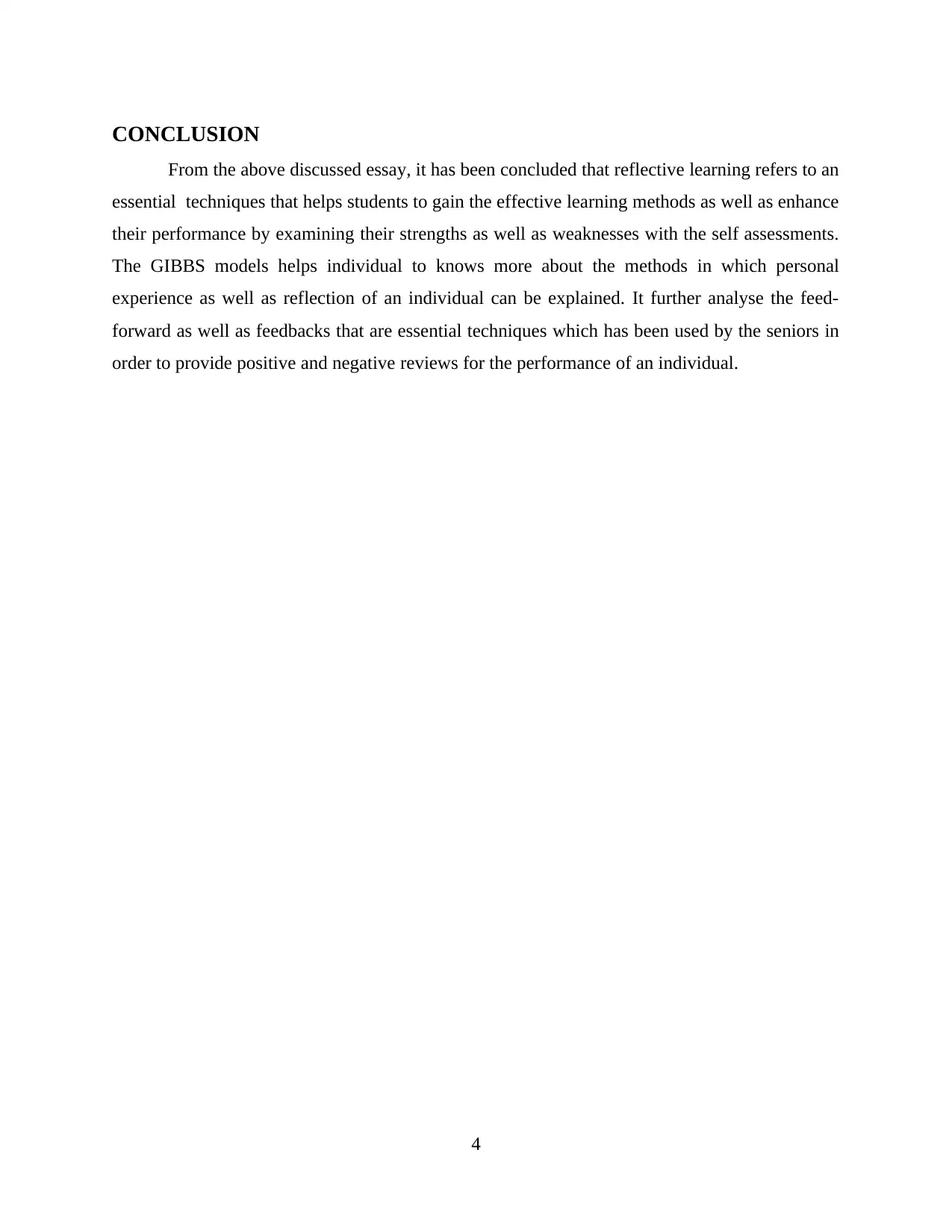
CONCLUSION
From the above discussed essay, it has been concluded that reflective learning refers to an
essential techniques that helps students to gain the effective learning methods as well as enhance
their performance by examining their strengths as well as weaknesses with the self assessments.
The GIBBS models helps individual to knows more about the methods in which personal
experience as well as reflection of an individual can be explained. It further analyse the feed-
forward as well as feedbacks that are essential techniques which has been used by the seniors in
order to provide positive and negative reviews for the performance of an individual.
4
From the above discussed essay, it has been concluded that reflective learning refers to an
essential techniques that helps students to gain the effective learning methods as well as enhance
their performance by examining their strengths as well as weaknesses with the self assessments.
The GIBBS models helps individual to knows more about the methods in which personal
experience as well as reflection of an individual can be explained. It further analyse the feed-
forward as well as feedbacks that are essential techniques which has been used by the seniors in
order to provide positive and negative reviews for the performance of an individual.
4
⊘ This is a preview!⊘
Do you want full access?
Subscribe today to unlock all pages.

Trusted by 1+ million students worldwide
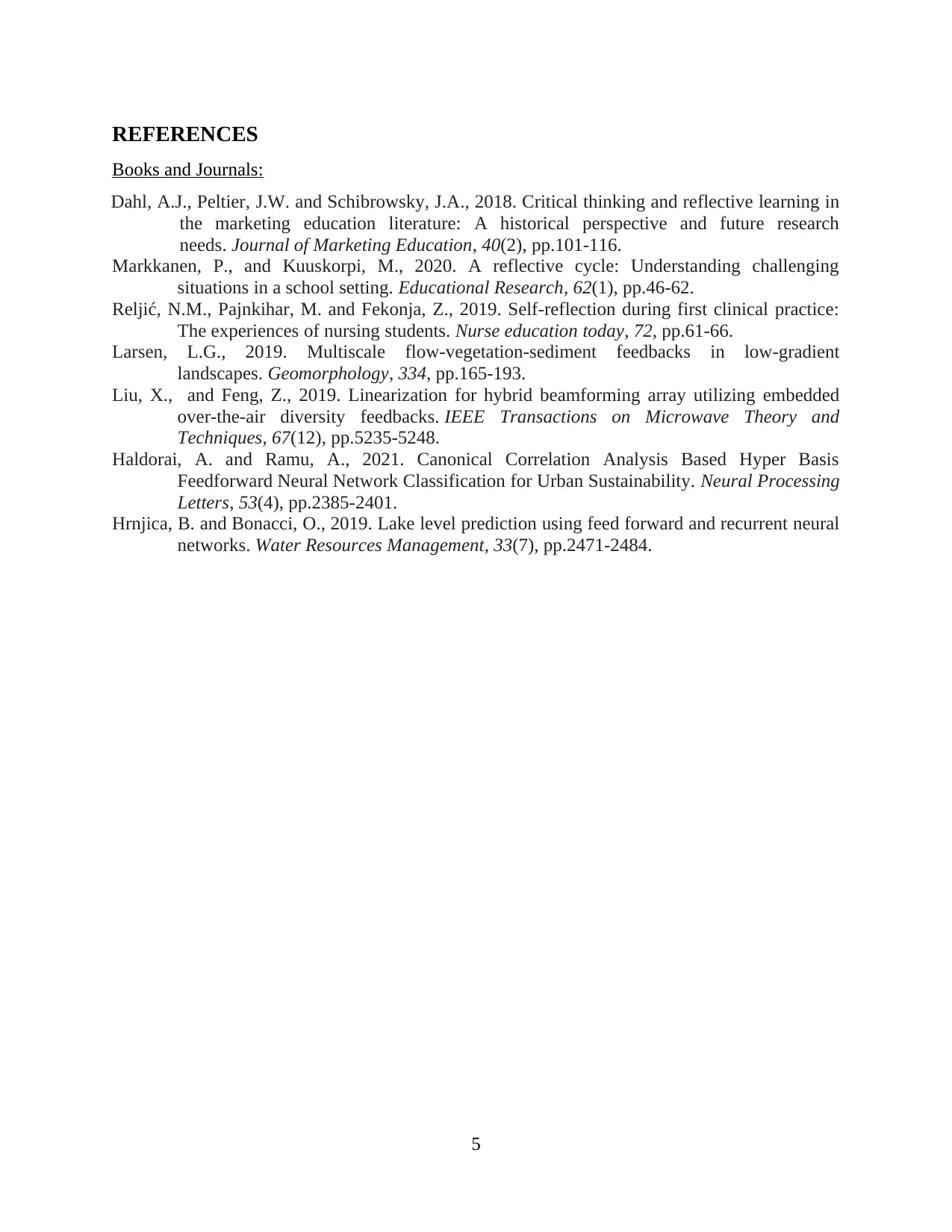
REFERENCES
Books and Journals:
Dahl, A.J., Peltier, J.W. and Schibrowsky, J.A., 2018. Critical thinking and reflective learning in
the marketing education literature: A historical perspective and future research
needs. Journal of Marketing Education, 40(2), pp.101-116.
Markkanen, P., and Kuuskorpi, M., 2020. A reflective cycle: Understanding challenging
situations in a school setting. Educational Research, 62(1), pp.46-62.
Reljić, N.M., Pajnkihar, M. and Fekonja, Z., 2019. Self-reflection during first clinical practice:
The experiences of nursing students. Nurse education today, 72, pp.61-66.
Larsen, L.G., 2019. Multiscale flow-vegetation-sediment feedbacks in low-gradient
landscapes. Geomorphology, 334, pp.165-193.
Liu, X., and Feng, Z., 2019. Linearization for hybrid beamforming array utilizing embedded
over-the-air diversity feedbacks. IEEE Transactions on Microwave Theory and
Techniques, 67(12), pp.5235-5248.
Haldorai, A. and Ramu, A., 2021. Canonical Correlation Analysis Based Hyper Basis
Feedforward Neural Network Classification for Urban Sustainability. Neural Processing
Letters, 53(4), pp.2385-2401.
Hrnjica, B. and Bonacci, O., 2019. Lake level prediction using feed forward and recurrent neural
networks. Water Resources Management, 33(7), pp.2471-2484.
5
Books and Journals:
Dahl, A.J., Peltier, J.W. and Schibrowsky, J.A., 2018. Critical thinking and reflective learning in
the marketing education literature: A historical perspective and future research
needs. Journal of Marketing Education, 40(2), pp.101-116.
Markkanen, P., and Kuuskorpi, M., 2020. A reflective cycle: Understanding challenging
situations in a school setting. Educational Research, 62(1), pp.46-62.
Reljić, N.M., Pajnkihar, M. and Fekonja, Z., 2019. Self-reflection during first clinical practice:
The experiences of nursing students. Nurse education today, 72, pp.61-66.
Larsen, L.G., 2019. Multiscale flow-vegetation-sediment feedbacks in low-gradient
landscapes. Geomorphology, 334, pp.165-193.
Liu, X., and Feng, Z., 2019. Linearization for hybrid beamforming array utilizing embedded
over-the-air diversity feedbacks. IEEE Transactions on Microwave Theory and
Techniques, 67(12), pp.5235-5248.
Haldorai, A. and Ramu, A., 2021. Canonical Correlation Analysis Based Hyper Basis
Feedforward Neural Network Classification for Urban Sustainability. Neural Processing
Letters, 53(4), pp.2385-2401.
Hrnjica, B. and Bonacci, O., 2019. Lake level prediction using feed forward and recurrent neural
networks. Water Resources Management, 33(7), pp.2471-2484.
5
1 out of 7
Related Documents
Your All-in-One AI-Powered Toolkit for Academic Success.
+13062052269
info@desklib.com
Available 24*7 on WhatsApp / Email
![[object Object]](/_next/static/media/star-bottom.7253800d.svg)
Unlock your academic potential
Copyright © 2020–2026 A2Z Services. All Rights Reserved. Developed and managed by ZUCOL.

